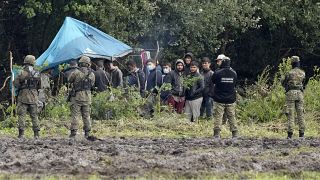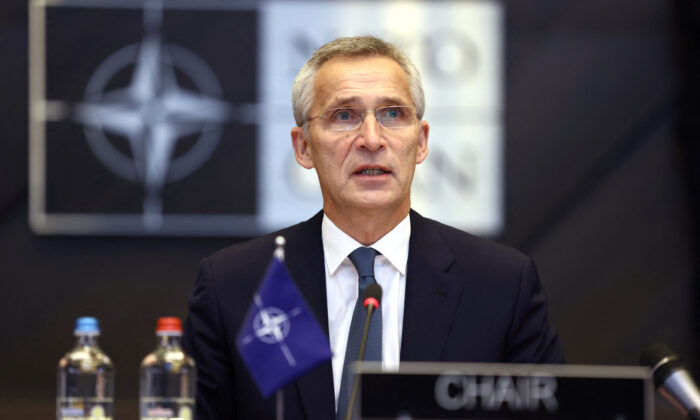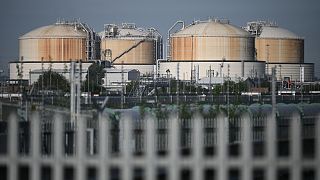EUROPE
1. Baltic Pipe undersea gas link makes landfall in Denmark
The Baltic Pipe gas pipeline, which is being built under the Baltic Sea to connect Poland with Norwegian gas fields via Denmark, has reached the Danish Baltic coast, officials have announced.
[…] The pipeline, which is part of Warsaw’s efforts to diversify gas supplies and reduce the country’s energy dependence on Russia, last month reached the Polish Baltic coast, according to Poland’s natural gas network operator Gaz-System.
https://www.polskieradio.pl/395/7989/Artykul/2831766
2. Two guards hurt during violence at Poland-Belarus border

Two border guards were hurt when a group of 60 migrants tried to forcefully cross the border from Belarus, the Polish border guards office said on Monday.
https://www.euronews.com/2021/10/25/two-guards-hurt-during-violence-at-poland-belarus-border
3. Poland is learning, as Britain did, that the EU will never let its members be sovereign
They must make a fundamental choice between being part of a state-in-the-making and secession
Sovereignty. It was always about sovereignty. Who gives orders and who takes them. In Lenin’s pithy formulation, “who, whom?”
Poland’s leaders are discovering what David Cameron discovered in 2015 when he tried to shore up the legal supremacy of Parliament, namely that Eurocrats are adept at doublethink. On the one hand, they deride sovereignty as a risible nineteenth-century hang-up, an empty husk, a myth invoked by nationalist demagogues. On the other hand, they care very deeply about their own sovereignty – specifically, about the primacy of EU law over the legal systems of the member states.
On October 7, Poland calmly and politely repudiated that principle. Its highest court, the Constitutional Tribunal, determined that, on Polish territory, national law had precedence over rulings by EU institutions.
[…]
“This ruling calls into question the foundations of the European Union,” fumed the President of the European Commission, Ursula von der Leyen. “It is a direct challenge to the unity of the European legal order.”
In a sense, she is right. The primacy of EU law is what turns a club of nations into a superstate. Take it away, and the EU becomes just one more international association like Nato, ASEAN or the Council of Europe.
[…] Nor is sovereignty at all incompatible with international treaties. A sovereign state is at liberty to enter into agreements with its neighbours and submit to binding arbitration mechanisms. What makes the EU’s treaties different from every other international accord is that they do not just apply to their signatories as states; rather, they create a new legal order that is directly binding on citizens with or without implementing legislation at national level. If there is a conflict, decisions by EU institutions override national statutes and even national constitutions. The EU is, in the exact sense, sovereign over its member countries.
Why, you might ask, did the member countries agree to this surrender? The answer is that they didn’t – at least, not until very recently. The primacy of EU law is not to be found anywhere in the Treaty of Rome. It was invented, rather, by the European Court of Justice (ECJ) in a series of controversial rulings which even committed federalists now admit amounted to a power-grab.
4. Invading Poland Again
The E.U. is not a common market. It is a liberal imperialist project
The European Union and the globalists who rule the European core revealed their hand last Thursday when some of the bloc’s leaders shamed Poland for purportedly violating the E.U.’s values and laws, once again proving that the E.U. is not a common market, but a liberal imperialist project.
Whether it’s logging in the Białowieża Forest, the refusal to take in refugees, press freedoms, or judiciary reform, the issues the E.U. and some of its member states have with Poland are multifaceted. Yet, at the root of all of their critiques of Poland is the idea that Poland’s sovereignty is second to that of the E.U. Warsaw ultimately answers to Brussels—and on occasion Luxembourg or Strasbourg—rather than the Polish people.
This is something Eurosceptics have recognized for quite a long time, even before Nigel Farage spearheaded the ultimately successful Brexit effort in the U.K., which still has internationalists biting their nails in fear of which domino might fall next—fears that haven’t yet come to fruition. Today, the Eurosceptics’ intuitions are being all but explicitly confirmed by those still committed to the European project.
https://www.theamericanconservative.com/articles/invading-poland-again/
GLOBAL
5. Russia-NATO Relations: Back to Rock Bottom
Diplomatic battles with NATO feed Russia’s desire for attention. (and contribute to its efforts to spread disdain for the West.)
Russia will suspend its mission to NATO following the expulsion of half its alliance-based staff for spying. Russian Foreign Minister Sergei Lavrov announced that staff at NATO’s military mission in Moscow would be stripped of their accreditation on November 1 and the alliance’s information office in Moscow would be closed.
Does it matter? Although the announcement may sound shocking, it changes nothing. NATO and Russia were barely on speaking terms anyway, and — as the spies’ identification makes clear — these eight officials were not deployed to improve relations. Russia has shown during the past decade that its spying operations are viewed as more important than the diplomatic fallout when its agents are caught. The Litvinenko murder of 2006, the Czech weapons bunker attack in 2014, the Salisbury poisonings of 2018, plus a multitude of cyberattacks and hacking operations, have brought the expected response from Western states, with multiple scores of Russian spies expelled.
6. China’s Military Declares Biotechnology Warfare as its Fundamental Guiding Principle
China’s People’s Liberation Army believes that biological weapons, not nuclear weapons, are the key to global military dominance.
In our recent Gateway Pundit article, we described the 2005 and 2006 Chinese military publications by Colonel Ji-wei Guo, who advocated the use of biotechnology in developing new methods of waging war and recommended that military medical doctors be involved in creating bioweapons.
In his 2008 book, “Biological Outlook on War and Foresight of Biotechnology Supremacy,” Colonel Guo elaborated on the application of biotechnology in bio-based war, representing the “Third Leap” in military strategy:
“The third leap includes biotechnology and related sciences that develop and grow on the basis of information technology (including advanced computer and communication), nano-science and other convergence technologies, where biotechnology and biomedical science (including genetic engineering), cognitive science (including cognitive neuroscience) are comprehensively applied. It will cause huge quantitative changes in the combat environment, combat methods, space-time relationship, military structure and function, and will eventually cause new qualitative changes, which will bring about profound changes in modern military history. The operational level change brought by this military transformation is the further extension of the theory of power control with modern biotechnology as the main feature.”
China’s Military Declares Biotechnology Warfare as its Fundamental Guiding Principle
7. NATO Will Concentrate on Countering the Chinese Threat for Next Decade: Stoltenberg

NATO will concentrate on countering the Chinese communist threat as part of next decade’s new strategic approach, according to its secretary-general, as reported by The Financial Times.
This comes as the Chinese regime has become more assertive in its ambitions of global dominance, having allegedly gained the upper hand in key warfare technologies, such as long-range and hypersonic missiles.
In his interview with The Financial Times, NATO secretary-general Jens Stoltenberg said China’s cyber capabilities, new technologies, and long-range missiles have already affected European security.
[…] The Chinese Communist Party (CCP) has embraced a more belligerent and blunt discourse regarding its global dominance ambitions this year, which has spurred the West to reorganize to counter the regime.
8. Winter Is Coming, And It’s Only A Preview
The world’s energy crunch will have indirect effects for years to come. The question is: How bad will things get?
For a world eager to emerge from the pandemic, this autumn’s dismal cocktail of economic developments harkens back to darker decades. There is a worldwide energy crunch, affecting basically every fuel, with rationing and blackouts in places around the globe. Some store shelves are empty. Some gas stations are dry. Supply chains are wheezing, and container ports are overwhelmed and underworking. Inflation is again rearing its head after years in abeyance.
The good news is the 1970s aren’t back just yet. The bad news is this fall’s energy crisis may be a harbinger of what’s to come: years of rising prices, pinched consumers, and struggling businesses.
Crude oil is more than $85 a barrel, its highest level since 2018. The price of natural gas is sky-high, especially in Europe, where it has roughly doubled since the summer and is four times pricier than one year ago. The price of coal is soaring, with the cost of coal in China regularly breaking records and Australian ore doubling since the spring.
The basic driver is a mismatch between demand, which has come roaring back after the world basically went on lockdown for a year, and supply, which has yet to recover. Globally, oil investment in new production capacity is still well below the level it was pre-pandemic—and even that was much lower than the boom years before 2014. Another change in recent years has been the reluctance of U.S. shale oil producers to turn on the taps immediately after oil prices go up; instead, burned by years of poor returns, shale producers have, for the most part, kept strict financial discipline, which has kept U.S. oil output below pre-pandemic levels. Similar dynamics affect gas production, with the twist that Europe’s main supplier—Russia—has been essentially standing on the hose in recent months, limiting extra gas supplies for export to Europe, which has kept prices at record levels.
[…] But due to years of underinvestment in oil production capacity, the world could be left struggling to meet still-rising demand for fossil fuels. “This is going to recur in a way that is going to be more reminiscent of the 1970s,” he said.
[…] But rising energy prices are driving inflation even higher than that—and almost everywhere: The eurozone has more than 3.4 percent inflation, the United Kingdom expects 4-plus percent inflation, prices in the United States are up more than 5 percent compared to last year, and Russian inflation is topping 7 percent. China’s factory-gate inflation—a measure of how much companies pay for goods—is rising at the fastest clip in 25 years.
[…] Plus, the energy crisis is also making the ongoing supply chain situation even worse. In China, power outages have led to reduced output at factories, with ripple effects on buyers around the world. In Europe, high energy prices have forced some producers—like steel works or makers of fertilizer—to scale back output.
[…] Shortages of key components like semiconductors led the eurozone’s industrial output to fall at the end of the summer, and consumer confidence in big economies, such as Germany, is now slipping.
[…] And there’s not likely to be relief from higher energy prices any time soon, which will act as a brake on economic growth everywhere.
9. Europe’s energy crisis: Five charts to explain why your bills might go up this winter

The cost is now six times higher than what it was last year in Europe and is continuing to increase, with the crisis unlikely to abate before the spring.
Governments are scrambling to issue subsidies and cut taxes in an effort to protect consumers.
Here are five charts to help you visualize what’s going on.